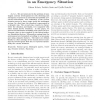581 search results - page 69 / 117 » Abstract Semantics by Observable Contexts |
FOSSACS
2004
Springer
15 years 7 months ago
2004
Springer
Abstract. Using a probabilistic polynomial-time process calculus designed for specifying security properties as observational equivalences, we develop a form of bisimulation that j...
120
click to vote
PLILP
1992
Springer
15 years 5 months ago
1992
Springer
Attribute grammars may be seen as a (rather specialised) lazy or demand-driven programming language. The "programs" in this language take text or parse trees as input an...
108
click to vote
WCE
2007
15 years 2 months ago
2007
Abstract—We are interested in the problem of multiagent systems development for risk detecting and emergency response in an uncertain and partially perceived environment. The eva...
228
click to vote
PLDI
2009
ACM
16 years 2 months ago
2009
ACM
As computer systems continue to become more powerful and comdo programs. High-level abstractions introduced to deal with complexity in large programs, while simplifying human reas...
120
click to vote
VEE
2009
ACM
15 years 8 months ago
2009
ACM
r of high-level languages lies in their abstraction over hardware and software complexity, leading to greater security, better reliability, and lower development costs. However, o...

